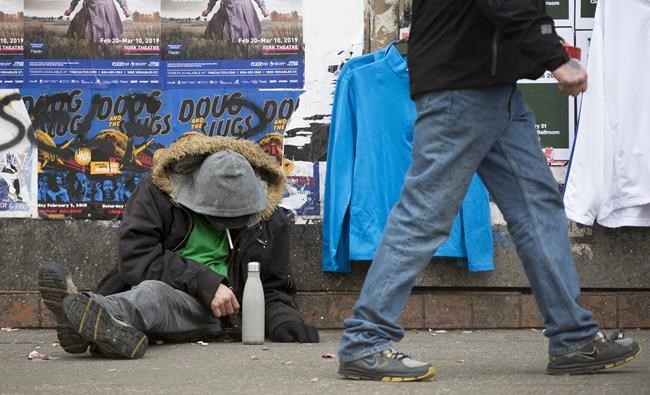
A man sits on a sidewalk along East Hastings Street in Vancouver's Downtown Eastside, Thursday, Feb 7, 2019. Liberal-NDP deal on pharmacare should include some illicit substances, advocates say. THE CANADIAN PRESS/Jonathan Hayward
Republished March 23, 2022 - 2:33 PM
Original Publication Date March 23, 2022 - 11:46 AM
OTTAWA - Advocates say they hope the agreement reached by the Liberals and New Democrats for a national pharmacare program will lead to coverage for some illicit substances.
Natasha Touesnard, executive director of the Canadian Association of People Who Use Drugs, said her organization has been calling for substances like cocaine, methamphetamines and heroin to be added to the list of drugs that are approved in a national pharmacare plan.
Eris Nyx, co-founder of the Drug User Liberation Front, agreed that including substances like opiates and stimulants in the pharmacare guidelines would be important, and that safe supply programs should be covered.
Petra Schulz, co-founder of advocacy group Moms Stop The Harm, said Tuesday she is hopeful that a pharmacare program would cover these types of substances if people need it.
Coverage for illicit substances would also help people access safe supply, especially among marginalized groups, such as people of colour and Indigenous peoples, Schulz said.
Nyx cautioned that she does not think these steps would meaningfully address drug overdose deaths in the community, and should only be used as interventions of last resort for people who have chaotic patterns of substance use.
"I couldn't go to my doctor and be like, 'Could you prescribe me a bottle of scotch for free that the government pays for?' If you substitute any of the narcotics for alcohol, it wouldn't make sense to put your focus on the medical system," she said by way of illustration.
Addressing the overdose crisis requires a range of models outside of a medical or prescriber-based system, Nyx said, such as a compassion club which distributes clean-tested drugs to its membership.
A medicalized model of access will be less useful to people who use drugs since many have had negative experiences in health-care settings, said Touesnard.
"Even if you have every drug available for people, they're not going to show up because of previous interactions, trauma and all these other sorts of things that happen when you're somebody that uses drugs," she said.
The Liberals and NDP reached an agreement this week that would see the opposition party support Justin Trudeau's minority government through to 2025 in exchange for progress on NDP priorities like pharmacare.
New Democrat MP and health critic Don Davies said he does not see a connection at all between the proposed national pharmacare program and safe supply.
Since January 2016, almost 25,000 Canadians have died from opioid-related causes, excluding Quebec, according to the Public Health Agency of Canada.
In 2020, Health Canada funded 10 safer supply pilot projects in British Columbia, Ontario and New Brunswick. Early findings from an assessment of the pilots said people reported a reduction in their reliance on the toxic drug supply, improved quality of life and decreased overdose risk.
This report by The Canadian Press was first published March 23, 2022.
---
This story was produced with the financial assistance of the Meta and Canadian Press News Fellowship.
News from © The Canadian Press, 2022